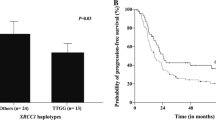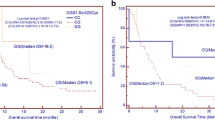Abstract
OGG1 (The human 8-oxoguanine glycosylase 1) is the primary enzyme in BER (base excision repair) pathway, responsible for the excision of 7, 8-dihydro-8-oxoguanine (8-oxoG), a mutagenic base byproduct that occurs as a result of exposure to reactive oxygen species. OGG1 gene is highly polymorphic among humans and is mutated in cancer cells. In this case control study, all exons of OGG1 gene and its exon/intron boundaries were amplified in 210 laryngeal cancer cases and 210 matched controls and then analyzed by single stranded conformational polymorphism. Amplified products showing altered mobility patterns were sequenced and analyzed. Two silent (Gln718Gln, His699-700His) and three missense (Ala597, Thr608-610Pro and Glu707Lys) mutations were observed in exon 2. In addition to this one missense mutation (1578G > A) was also observed in 3′UTR region. We found a significant association between OGG1 mutations and laryngeal cancer and observed that His699-His700, silent mutation exhibited an enhanced risk of ~9.0 folds (OR = 9.07, 95 % CI = 4.73–17.39) and 1578G > A, missense mutation ~0.4 folds (OR = 0.37, 95 % CI = 0.15–0.90). Furthermore, a positive association of OGG1 mutations with smoking was observed in laryngeal cancer cases when compared to controls. Heavy smokers have higher incidence of OGG1 mutations when compared to light smokers in present study. Our results demonstrate that OGG1 mutations are associated with an increased risk of laryngeal cancer. OGG1 mutations were found to accumulate more of 8-OHdG in smokers, which may serve as a biomarker for early diagnosis of laryngeal cancer.

Similar content being viewed by others
References
IARC Working Group on the Evaluation of Carcinogenic Risks to Humans (2004) Tobacco smoke and involuntary smoking. IARC Monogr Eval Carcinog Risks Hum 83:1–1438
Mizokami H, Sawatsubashi M, Tokunaga O, Shin T (1999) Loss of retinoblastoma protein expression in laryngeal squamous cell carcinoma. Mol Pathol 12:47–53
Chacko P, Rajan B, Joseph T, Mathew BS, Pillai MR (2005) Polymorphisms in DNA repair gene XRCC1 and increased genetic susceptibility to breast cancer. Breast Cancer Res Treat 89:15–21
Hansen WK, Kelley MR (2000) Review of mammalian DNA repair and translational implications. J P E T 295:1–9
Yamane A, Kohno T, Ito K, Sunaga N, Aoki K, Yoshimura K et al (2004) Differential ability of polymorphic OGG1 proteins to suppress mutagenesis induced by 8-hydroxyguanine in human cell in vivo. Carcinogenesis 25:1689–1694
Ide H, Kotera M (2004) Human DNA Glycosylases involved in the repair of oxidatively damaged DNA. Biol Pharm Bull 27:480–485
Zhang H, Mizumachi T, Carcel-Trullols J, Li L, Naito A, Spencer HJ et al (2007) Targeting human 8-oxoguanine DNA glycosylase (hOGG1) to mitochondria enhances cisplatin cytotoxicity in hepatoma cells. Carcinogenesis 28:1629–1637
Park HW, Kim IJ, Kang HC, Jang SG, Ahn SA, Lee JS et al (2007) The hOGG1 Ser326Cys polymorphism is not associated with colorectal cancer risk. J Epidemiol 17:156–160
Bruner SD, Norman DP, Fromme JC, Verdine GL (2000) Structural and mechanistic studies on repair of 8-oxoguanine in mammalian cells. Cold Spring Harb Symp Quant Biol 65:103–111
Labahn J, Scharer OD, Long A, Ezaz-Nikpay K, Verdine GL, Ellenberger TE (1996) Structural basis for the excision repair of alkylation-damaged DNA. Cell 86:321–329
Fromme JC, Banerjee A, Verdine GL (2004) DNA glycosylase recognition and catalysis. Curr Opin Struct Biol 14:43–49
Hollis T, Lau A, Ellenberger T (2001) Crystallizing thoughts about DNA base excision repair. Prog Nucleic Acid Res Mol Biol 68:305–314
Bjoras M, Seeberg E, Luna L, Pearl LH, Barrett TE (2002) Reciprocal “flipping” underlies substrate recognition and catalytic activation by the human 8-oxo-guanine DNA glycosylase. J Mol Biol 317:171–177
Parker AR, Meally RN, Sahin F, Su GH, Racke FK, Nelson WG, DeWeese TL, Eshleman JR (2003) Defective human MutY phosphorylation exists in colorectal cancer cell lines with wild-type MutY alleles. J Biol Chem 278:47937–47945
Minowa O, Arai T, Hirano M, Monden Y, Nakai S, Fukuda M, Itoh M, Takano H, Hippou Y, Aburatani H et al (2000) Mmh/Ogg1 gene inactivation results in accumulation of 8-hydroxyguanine in mice. Proc Natl Acad Sci USA 97:4156–4161
Arai T, Kelly VP, Komoro K, Minowa O, Noda T, Nishimura S (2003) Cell proliferation in liver of Mmh/Ogg1-deficient mice enhances mutation frequency because of the presence of 8-hydroxyguanine in DNA. Cancer Res 63:4287–4292
Friedberg EC, Walker GC, Siede W, Wood RD, Schultz RA, Ellenberger T (2006) DNA repair and mutagenesis. ASM Press, Washington DC
Le Marchand L, Donlon T, Lum-Jones A, Seifried A, Wilkens LR (2002) Association of the hOGG1 Ser326Cys polymorphism with lung cancer risk. Cancer Epidemiol Biomarkers Prev 11:409–412
Xing DY, Tan W, Song N, Lin DX (2001) Ser326Cys polymorphism in hOGG1 gene and risk of esophageal cancer in a Chinese population. Int J Cancer 95:140–143
Tsukino H, Hanaoka T, Otani T, Iwasaki M, Kobayashi M, Hara M et al (2004) hOGG1 Ser326Cys polymorphism, interaction with environmental exposures, and gastric cancer risk in Japanese populations. Cancer Sci 95:977–983
Ramachandran S, Ramadas K, Hariharan R, Kumar RR, Pillai MR (2005) Single nucleotide polymorphisms of DNA repair genes XRCC1 and XPD and its molecular mapping in Indian oral cancer. Oral Oncol 42:350–362
Audebert M, Chevillard S, Levalois C, Gyapay G, Vieillefend A, Klijanienko J, Veilh P, EI Naggar AK, Oudard S, Boiteux S, Radicella JP (2000) Alterations of DNA repair gene OGG1 in human clear cell carcinomas of kidney. Cancer Res 60:4740–4744
Chevillard S, Radicella JP, Levalois C, Lebeau J, Poupon MF, Oudard S, Dutrillaux B, Boiteux S (1998) Mutations in OGG1, a gene involved in the repair of oxidative DNA damage, are found in human lung and kidney tumours. Oncogene 16:3083–3086
Kohno T, Shinmura L, Tosaka M, Tani M, Kim SR, Sugimura H, Nohmi T, Kasai H, Yokota J (1998) Genetic polymorphisms and alternative splicing of the hOGG1 gene, that is involved in the repair of 8-hydroxyguanine in damaged DNA. Oncogene 16:3219–3225
Kondo S, Toyokunki S, Tanaka T, Hiai H, Onodera H, Kasai H, Imamura M (2000) Overexpression of hOGG1 gene and high 8-hydroxy-2′-deoxyguanosine (8-OHdG) lyase activity in human colorectal carcinoma: regulation mechanism of the 8-OHdG level in DNA. Clin Cancer Res 6:1394–1400
Asami S, Hirano T, Yamaguchi R, Tomioka Y, Itoh H, Kasai H (1996) Increase of a type of oxidative DNA damage, 8-hydroxyguanine, and its repair activity in human leukocytes by cigarette smoking. Cancer Res 56:2546–2549
Kiyosawa H, Suko M, Okudaira H, Murata K, Miyamoto T, Chung MH, Kasai H, Nishimura S (1990) Cigarette smoking induces formation of 8-hydroxydeoxyguanosine, one of the oxidative DNA damages in human peripheral leukocytes. Free Radic Res Commun 11:23–27
Paz-Elizur T, Ben-Yosef R, Elinger D, Vexler A, Krupsky M, Berrebi A, Shani A, Schechtman E, Freedman L, Livneh Z (2006) Reduced repair of the oxidative 8-oxoguanine DNA damage and risk of head and neck cancer. Cancer Res 66:11683–11689
Asami S, Manabe H, Miyake J et al (1997) Cigarette smoking induces an increase in oxidative DNA damage, 8-hydroxydeoxyguanosine, in a central site of the human lung. Carcinogenesis 18:1763–1766
Suzuki K, Ito Y, Ochiai J et al (2003) The relationship between smoking habits and serum levels of 8-OHdG, oxidized LDL antibodies, Mn-SOD and carotenoids in rural Japanese residents. J Epidemiol 13:29–37
Yarborough A, Zhang YJ, Hsu TM, Santella RM (1996) Immunoperoxidase detection of 8-hydroxydeoxyguanosine in aflatoxin B1-treated rat liver and human oral mucosal cells. Cancer Res 56:683–688
Acknowledgments
This study was supported by a grant from Higher Education Commission, Islamabad (Pakistan) as well as CIIT Islamabad.
Conflict of interest
The authors declare that they have no conflict of interest.
Author information
Authors and Affiliations
Corresponding author
Rights and permissions
About this article
Cite this article
Mahjabeen, I., Masood, N., Baig, R.M. et al. Novel mutations of OGG1 base excision repair pathway gene in laryngeal cancer patients. Familial Cancer 11, 587–593 (2012). https://doi.org/10.1007/s10689-012-9554-2
Published:
Issue Date:
DOI: https://doi.org/10.1007/s10689-012-9554-2




